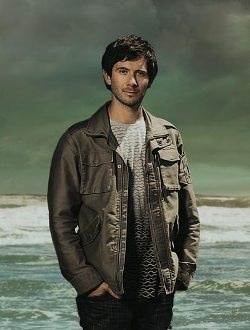When the Rain Stops Falling
Herald Theatre, Aotea Centre, The Edge, Auckland
04/06/2010 - 03/07/2010
Production Details
plays 4th June – 3rd July
Tickets available through THE EDGE – www.buytickets.co.nz or 09 357 3355
Dark and disturbing tale of tragedy
Review by Janet McAllister 08th Jun 2010
Andrew Bovell’s play explores the darkest depths of family drama
God, this is bleak – fabulously so. An excellent production of a near-brilliant epic, it piles aching misery on tragic crisis on disturbing horror. Australian playwright Andrew Bovell pushes past family melodrama to find something so dark it makes Arthur Miller’s characters seem self-indulgent and screechy.
Under the accomplished direction of Shane Bosher, When the Rain Stops Falling requires very little shouting to layer on the tension. Instead, parents and children don’t talk to each other because they have too much to say.
Bad things happen in the Outback (really, English tourists should know better than to go there by now). The climactic scene, bathed in blood-red light, set my heart racing. The play doesn’t deserve such a soppy name. [More]
_______________________________
For more production details, click on the title above. Go to Home page to see other Reviews, recent Comments and Forum postings (under Chat Back), and News.
Copyright © in the review belongs to the reviewer
History repeats in funny, sad, gritty and thought provoking play
Review by Nik Smythe 05th Jun 2010
The plot, spanning 80 years and told out of chronological sequence, involves four generations of parents and children. We travel between the dense metropolis of London, the vast isolation of Central Australia: Alice Springs, Coorong and inland to the mighty Uluru. The convoluted events of the tangled tale include a number of running themes: fish, paint, hats and umbrellas and mainly rain – it’s raining in just about every scene.
We begin in the future (2039) when fish are all but extinct, yet one has dropped out of the sky into the hands of 50 year old Gabriel York (Stephen Lovatt), just when he needed it in an episode resembling divine intervention, though no-one regards it seriously as such. It seems at first as though we’re in for an ecological parable, though this aspect turns out to be little more than a circumstantial sub-plot.
The next scene is 1988 in Thatcher’s London, where young Gabriel Law (Simon London) is trying to learn more about his father from his ageing mother Elizabeth (Jennifer Ludlum). Then it’s 1959, London again, where we meet a younger Elizabeth (Tandi Wright) and her husband Henry Law (Lovatt), a likeable young married couple on the day they find out they are with child.
Continuing in this manner, forward and back thru different time periods, the first half of the play creates many questions which the second half answers, though creates more questions in the process. Most of the relationships either start off or become fairly estranged; dysfunctional at best. And much of the intrigue for the watcher comes from what we know, but the characters don’t.
I’m unsure as to whether it’s the script’s intention, but I notice Lovatt and London each play two roles, whereas Wright and Ludlam share the same character in different decades, as do Morgana O’Reilly and Jude Gibson respectively as the younger and older Alice Springs roadhouse manager Gabrielle (that’s right, there are two Gabriels and one Gabrielle). Peter Elliot as Gabrielle’s lovingly long-suffering husband Joe is the only actor to have a single role to himself.
Besides the excellent performances delivered under Bosher’s skilled directing hand, the production design goes a long way in giving definition to the elaborate saga. John Verryt’s quite minimal set – long wooden table and chairs, smaller table for the fish soup and a row of coat hooks along the back wall, is effectually distinguished by wide cracks resembling tectonic plates in the uneven floor. A weathered wood panel stretching the length of the downstage wall serves as a projection screen to evoke various locales and climates (again – mostly rain).
Jeremy Fern’s lighting design works in seamlessly, highlighting scenes and characters just so without upstaging the play – as usual. Elizabeth Whiting’s costumes work similarly, creating an appropriate sense of time and place, as does the superb dramatic composition of Tama Waipara’s soundtrack.
One technical niggle distracted me slightly: in the scene where Gabriel and Gabrielle are driving home from Uluru, the rain-splattered road lines behind them are moving towards us giving the impression they’re driving backwards (!).
Also, although there is no scheduled interval, we got one after all on opening night no thanks tothe infernally shrill bleeping of some techno-gadget in the fly rig, conspicuously invading what is a wholly atmospheric piece. The audience had to be vacated whilst they dealt with the problem, which unfortunately continued intermittently through the remainder of the show. It is testament to the valiant cast that they continued regardless and we still received the majority of the play’s impact. Hopefully this won’t be an issue again!
With all it’s layers and interwoven plot elements, When the Rain Stops Falling is a worthwhile 90 minutes of funny, sad, gritty and thought provoking contemporary theatre in which history often repeats itself, and obscure objects are treasured by their custodians as symbols of their own identity, long after the stories behind them are forgotten. _______________________________
For more production details, click on the title above. Go to Home page to see other Reviews, recent Comments and Forum postings (under Chat Back), and News.
Copyright © in the review belongs to the reviewer
Comments
Make a comment
You must be logged in to post a comment.
Make a comment
You must be logged in to post a comment.





Comments